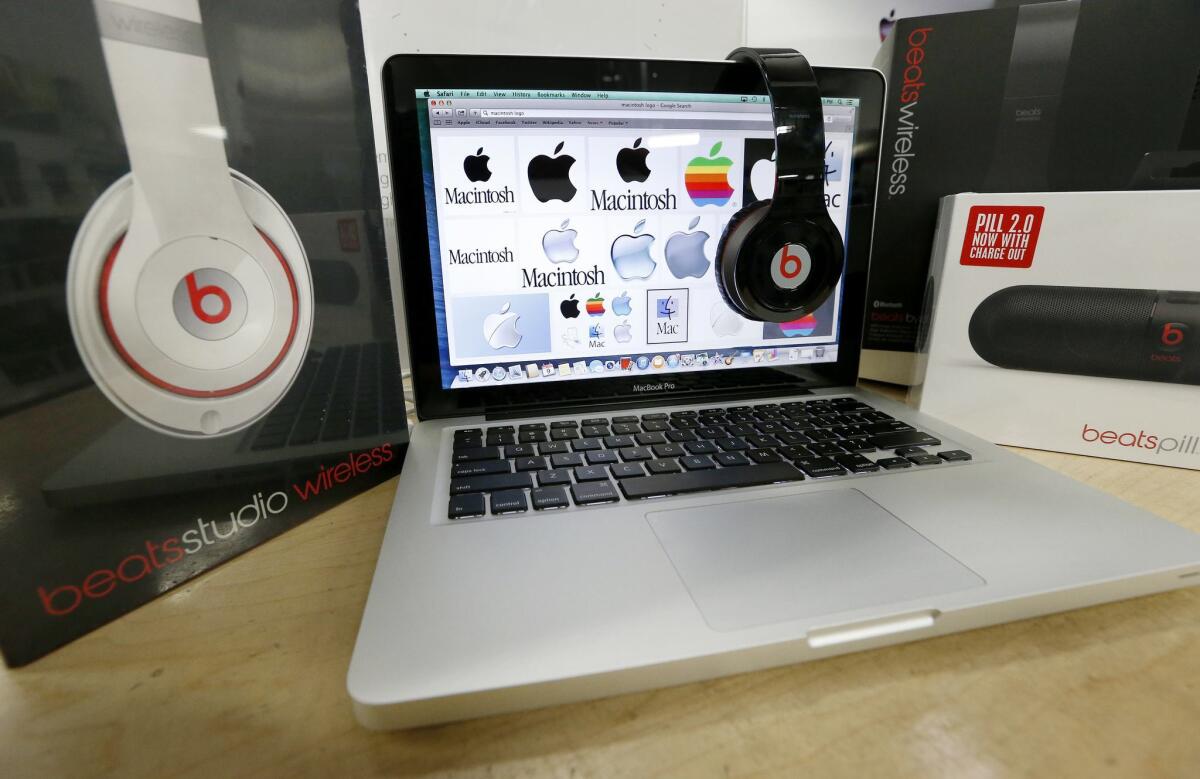Searching Apple’s history for a rationale for buying Beats

- Share via
As my colleague Chris O’Brien notes, Apple’s reported interest in buying Beats Electronics for $3.2 billion is causing a lot of head-shaking and tongue-clucking among tech and finance cognoscenti. Even some of the company’s most famous (or notorious) cheerleaders are publicly expressing befuddlement. The offer seems too rich, the technology too ... pedestrian.
I won’t pretend to read Apple Chief Executive Tim Cook’s mind. Still, I can see why this deal might fit into the pattern Apple has set over the past decade and a half. If I squint.
One of the qualities that sets Apple apart is its ability to recognize when the masses are ready to make a leap that technology makes possible, then persuade them to do so. Or at least that was its hallmark during the late Steve Jobs’ tenure. The iPod wasn’t the first MP3 player, the iTunes Store wasn’t the first place to buy downloadable songs, the iPhone wasn’t the first smartphone, and the iPad wasn’t the first tablet computer. But they were the first products of their kind to succeed, thanks to Apple’s ability to combine uncanny timing with compelling technology and powerful marketing.
Beats makes headphones and powered speakers, which are the kind of things Apple has typically left to the accessories market to supply. But it also sells people unlimited access to an online music jukebox for $10 a month, which is probably the reason for Apple’s interest.
Beats Music is the sort of “rental” service that Jobs used to ridicule, and rightly so -- at the time. “People want to own their music,” he would say, then point out how few customers the subscription services had in comparison to iTunes.
With one exception, those services continue to struggle to sign up paying customers. A wide assortment of subscription offerings have come and gone, with such major brands as Yahoo, Microsoft and Sony unable to make them work. Rhapsody, which launched before iTunes, had all of 1.7 million subscribers in April. Even Spotify, which had 6 million paying customers worldwide as of March 2013, appears not to be the juggernaut it once seemed. The masses have been much quicker to embrace free streaming and custom radio services, such as Pandora’s, confining paid music-on-demand offerings largely to the aficionado fringe.
Part of the problem for subscription services, though, is that they leaped ahead of both the music industry and the available technology. Anti-piracy controls ensured that the services could not be used with the most popular portable music player, namely the iPod. Many popular artists’ works weren’t available because the record companies didn’t have the relevant rights. It took years to persuade the labels to accept a “freemium” model such as Spotify’s, which tries to hook consumers by offering a free, advertiser supported version of its music-on-demand service.
The technological hurdles are gone now, as smartphones enable a subscription service to be fully portable. The labels seem to be fully on board, even if some artists continue to question the low royalty rates. Could the final barrier be getting consumers to see that they, too, are ready to make the leap? And isn’t Apple exceptionally good at making that kind of sale?
Granted, if Apple believed it was time to make a music subscription service the new must-have thing, you’d think it would develop its own product -- one that would be particularly appealing when used on a new Apple device. It obviously has the software chops and the necessary relationships with copyright holders. The popularity of the iTunes Store also might give it the leverage to wrangle more favorable licensing terms than other subscription services have received.
What sets Beats Music apart, though, is that it’s not just a slick piece of software. More than other services, it is laden with programming. It wants to be your DJ, not your jukebox. In that sense, it’s offers an Apple-esque ease of use. While its rivals start from the assumption that people want to search for something specific and then play it, Beats starts from the assumption that people want to be entertained.
In other words, Beats isn’t focusing on the music junkies who love Rdio and Rhapsody. It’s aiming for the masses. Maybe, just maybe, Apple decided that buying Beats would be a quicker, less expensive way to outrace Spotify to the millions of mainstream users who’ve yet to be converted. After all, the company would bring Apple a bucket load of headphone and speaker sales revenue, too. Plus, with Samsung offering its own music service (built on Slacker’s appealing offering), Apple may be feeling pressure to respond in a hurry.
There’s one other thing Apple does better than most other companies: it persuades people to pay a premium for its wares. And at $10 a month, Beats and its ilk cost considerably more than the average American spends on music. That may be a bridge too far even for Apple, but I’ve long wondered how much better the subscription market would be doing if Apple were in it. We may find out soon enough.







